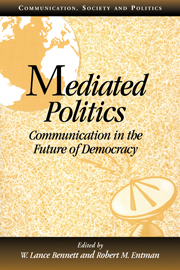Book contents
- Frontmatter
- Contents
- List of Figures
- List of Tables
- Contributors
- Preface
- Acknowledgments
- 1 Mediated Politics: An Introduction
- Part 1 Democracy and the Public Sphere
- Part 2 Citizens, Consumers, and Media in Transition
- Part 3 Mediated Political Information and Public Opinion
- 10 Reframing Public Opinion as We Have Known It
- 11 Political Waves and Democratic Discourse: Terrorism Waves During the Oslo Peace Process
- 12 Monica Lewinsky and the Mainsprings of American Politics
- 13 The Big Spin: Strategic Communication and the Transformation of Pluralist Democracy
- 14 The Impact of the New Media
- Part 4 Mediated Campaigns
- Part 5 Citizens: Present and Future
- Index
14 - The Impact of the New Media
Published online by Cambridge University Press: 05 June 2012
- Frontmatter
- Contents
- List of Figures
- List of Tables
- Contributors
- Preface
- Acknowledgments
- 1 Mediated Politics: An Introduction
- Part 1 Democracy and the Public Sphere
- Part 2 Citizens, Consumers, and Media in Transition
- Part 3 Mediated Political Information and Public Opinion
- 10 Reframing Public Opinion as We Have Known It
- 11 Political Waves and Democratic Discourse: Terrorism Waves During the Oslo Peace Process
- 12 Monica Lewinsky and the Mainsprings of American Politics
- 13 The Big Spin: Strategic Communication and the Transformation of Pluralist Democracy
- 14 The Impact of the New Media
- Part 4 Mediated Campaigns
- Part 5 Citizens: Present and Future
- Index
Summary
Everybody has a hypothesis about the impact of the new media. According to recent reports the new media have variously initiated or reinforced trends that have
Weakened political party systems
Offered a new platform for hate speech
Stimulated a new capacity for grassroots democracy
Permitted the third world to leapfrog painful stages of industrialization into an information economy
Robbed children of their childhood and everybody of their sense of place
Sped up the process of government responses to international crises precluding appropriate deliberation
Isolated family members from each other
Permanently stabilized the business cycle
Exacerbated gaps between information haves and have-nots
Limited the capacity of authoritarian regimes to control the flow of information within and outside of their realm
Readers will recognize many of these as preowned hypotheses, most not particularly low mileage at that. Much of the evidence of such effects is derived from the selective accumulation of anecdotes. Systematic empirical research struggles for methodologies capable of distinguishing the causal impact of new technologies from other historical trends and cycles. Further, the most radical new technologies such as the Internet are still at early stages of diffusion, challenging the analyst to distinguish the characteristics of early adopters and of early implementations from the underlying character of the technology.
I would argue that the academic community should acknowledge and encourage the journalistic battle of anecdotes. Although the question of whether the Internet will turn us into a nation of porno addicts or political know-nothings might seem less than optimally framed for designing research, it reflects the characteristic style of popular journalism and general public concern.
- Type
- Chapter
- Information
- Mediated PoliticsCommunication in the Future of Democracy, pp. 299 - 320Publisher: Cambridge University PressPrint publication year: 2000
- 2
- Cited by

